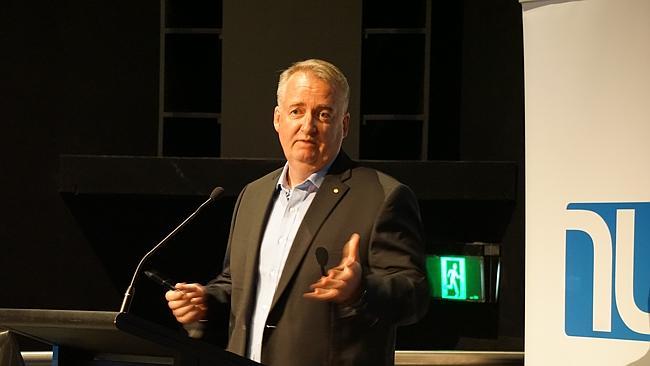Data retention absolutely necessary: assistant commissioner Tim Morris
AFP Assistant Commissioner Tim Morris has a message: data retention is necessary for policing, especially counterterrorism.

AUSTRALIAN Federal Police Assistant Commissioner Tim Morris is on a mission. With just days before a key parliamentary committee delivers a report on proposed data retention laws, he has a message: data retention is necessary for policing, especially counterterrorism.
Mr Morris said “92 per cent of all our counterterrorism investigations use metadata”.
“Across a whole range of crime types, terrorism is at the foremost of our minds for obvious reasons,” he said. “But metadata and telecommunications data is a vital aspect of all serious crime investigations, whether it’s child exploitation, serious and organised crime, cyber crimes, but yes, terrorism absolutely.”
The industry working group involved with the data retention bill had advocated retention of six data sets: the account, subscriber, and history, the source and destination of a communication, its time and duration, and type of communication such as a call or online activity.
“The draft bill specifically excludes web browser history from the data retention,” Mr Morris stressed. In the case of web browsing, only the user’s IP address would be retained.
It would not cover common online activity such as calls on Skype and Viber, downloading of files on services such as BitTorrent, anonymous email that could be cleverly routed through several servers, and there is the issue of encryption and use of virtual private networks (VPNs).
Mr Morris said the AFP had other means to tackle these.
“Some of those applications are often retained in servers outside of Australia, and often in the United States. In those cases we have other legal remedies, such as a mutual legal assistance request, and under the Budapest Convention, which Australia is a signatory to in the US, we can ask for that data to be frozen while we seek the mutual legal assistance request.”
He said accessing metadata was a preliminary step in an investigation. It provided the evidence the AFP could use to argue for a warrant to access the content of communications.
“What many people don’t realise is, it’s almost like the precursor to being able to understand what’s occurring … you need the metadata before going for the content,” he said.
“For example, metadata might uncover that a certain person calls every time before a criminal act occurs. He (a perpetrator) sells a kilo of cocaine in a hotel and calls person X, we’re interested in who person X is. That would raise our level of suspicion to say, well who is on the other end of that number.”
The proposal is for telcos and ISPs to retain data for two years, although the AFP wanted longer. “We’ve made major concessions to industry and what we’re saying is a minimum of two years,” Mr Morris said.
He said many crimes were only discovered and investigated well after they occurred, sometimes years later. Key metadata surrounding a crime that took place more than two years ago would be lost under this proposal.
But can he allay community concerns about metadata being misused or falling into the wrong hands? And what about fears the AFP could uncover a journalist’s confidential sources using metadata? Important public interest stories depend on such covert relationships.
“You can’t give a guarantee about anything,” Mr Morris told The Australian. “You can’t give a guarantee that journalists won’t misuse their expense accounts, you can’t give a guarantee that existing powers won’t be misused.
“However I’m glad to say that in the proposed bill, there’s an expanded role for the Ombudsman to have a very specific inspection and reporting regime to look at this very specific matter.”
One of the concerns of critics is whether the Ombudsman will receive sufficient funds for this additional responsibility. That the Ombudsman would exert such a role is by no means clear.
He also offered little comfort for journalists. “I know that under the law that journalists are not recognised in the same status as priests and doctors in terms of their status and confidentiality, but suffice to say, that police are investigating criminal offences, and if you’re referring to the common scenario where you might have a leaker reporting to a journalist, we’re not investigating a journalist,” Mr Morris said.
“We’re investigating a potential criminal offence by an individual who’s suspected of breaking the law.”
Mr Morris said that in the end, journalists might be better off not using electronic means of communication with confidential sources. It is a return to the 1970s scenario of Deep Throat’s garage meetings with Washington Post journalists during Watergate.
“If a journalist is worried about that, I suggest they make alternate arrangements with their sources,” he said.
Twitter was in the public domain and not covered by the bill. Facebook however offered privacy and Mr Morris said Facebook’s data was held offshore and the AFP could use the mutual legal assistance avenue to access it.


